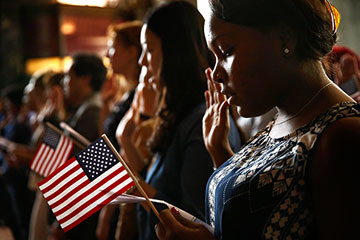
Vishaun Lawrence of Jamaica during a naturalization ceremony in Chicago last year.
(4 of 8)
The one thing my sons are always amazed by when they visit India is the condescension displayed toward entire groups of people. They hate the way people speak to their maids, their drivers, their waiters--anybody Indians consider socially inferior. I try to explain to them that India has been independent for only 60-odd years and the U.S. for more than three times as long and that while India has made great progress in pursuing democracy, it hasn't yet translated into social and economic equality.
The new American racism, however, is turning the clock backward. While Chua and Rubenfeld are not the only ones peddling this pernicious line of thought, their book is likely to make them prominent spokespeople for it. So it's worth taking a close look at the "evidence" they marshal for their argument. Too often they--and their compatriots--ignore the realities of American history to make their half-baked theories stick.
The authors attempt to barricade themselves against charges of racism by protesting that the Triple Package has nothing to do with race or IQ; it's about ethnicity. So not all blacks are losers--look at Nigerians and Liberians! They are so well represented in the Ivy League! But the authors fail to acknowledge that Africans and Afro-Caribbeans are beneficiaries of affirmative action, won through the civil rights struggles of African Americans. What's more, African Americans are not in a bad way because of lack of racial pride or a problem with their impulses. Their challenges as a community trace back centuries; they were brought here in chains, their women raped and their families deliberately broken. This is what President Obama was talking about in his remarks after the Trayvon Martin verdict, when he said, "I think it's important to recognize that the African-American community is looking at this issue through a set of experiences and a history that doesn't go away."
Time and again, when examining the claims of the new racialists, we find other, deeper, often more complex explanations for why the children of some groups do better than others.
As Nancy Foner, a leading immigration scholar, points out in an essay, "Today, the way East Asian--as opposed to black or Hispanic--immigrants fit into New York's racial hierarchy makes a difference in the opportunities they can provide their children." Because they are not black, she notes, "East Asian (and white) immigrants face less discrimination in finding a place to live and, in turn, send their children to school." That translates into greater access to heavily white neighborhoods with good public schools. Moreover, even if they attend school with native-born blacks and Latinos, they do not feel a bond of race with native minorities--making them less likely to become part of a peer culture found among some disaffected inner-city black and Latino youth.
